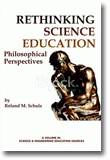
Rethinking Science Education
Philosophical Perspectives
A volume in the series: Science & Engineering Education Sources. Editor(s): Mark J. Lattery, University of Wisconsin Oshkosh.
Published 2014
This book presents a “philosophy of science education” as a research field as well as its value for curriculum, instruction and teacher pedagogy. It seeks to re-think science education as an educational endeavour by examining why past reform efforts have been only partially successful, including why the fundamental goal of achieving scientific literacy after several “reform waves” has proven to be so elusive. The identity of such a philosophy is first defined in relation to the fields of philosophy, philosophy of science, and philosophy of education. It argues that educational theory can support teacher’s pedagogical content knowledge and that history, philosophy and sociology of science should inform and influence pedagogy. Some case studies are provided which examine the nature of science and the nature of language to illustrate why and how a philosophy of science education contributes to science education reform. It seeks to contribute in general to the improvement of curriculum design and science teacher education. The perspective to be taken on board is that to teach science is to have a philosophical frame of mind—about the subject, about education, about one’s personal teacher identity.
CONTENTS
Abstract. Preface. Acknowledgments. Introduction: Philosophical Perspectives on Science Education. Chapter 1: Defining the Identity of the Philosophy of Science Education: Surveying the Terrain. Chapter 2: Science Education Reform and the Need for Philosophy of Science: Education and Educational Theory. Chapter 3: Philosophy of Science Education and Kieran Egan’s Educational Metatheory. Chapter 4: Philosophy of Science Education, Epistemology, and Nature of Science (NoS). Chapter 5: Philosophy of Science Education and Nature of Language. Chapter 6: Conclusion. References. About the Author.
-
Paperback9781623967147
Web price: $45.04 (Reg. 52.99)
-
Hardcover9781623967154
Web price: $80.74 (Reg. 94.99)
- eBook9781623967161

- EDU007000 - EDUCATION: Curricula
- EDU029030 - EDUCATION: TEACHING METHODS & MATERIALS: Science & Technology
- EDU024000 - EDUCATION: Reference
-
 College Teaching and the Development of Reasoning
College Teaching and the Development of Reasoning
-
 Deep Learning in Introductory Physics
Exploratory Studies of Model‐Based Reasoning
Deep Learning in Introductory Physics
Exploratory Studies of Model‐Based Reasoning
-
 Developing Science Literacy in the 21st Century
Developing Science Literacy in the 21st Century
-
 Reflections on People, Policy, and Practices in Curriculum History
Reflections on People, Policy, and Practices in Curriculum History
-
 Successful Science and Engineering Teaching in Colleges and Universities, 2nd Edition
Successful Science and Engineering Teaching in Colleges and Universities, 2nd Edition
-
 Using and Developing Measurement Instruments in Science Education
A Rasch Modeling Approach 2nd Edition
Using and Developing Measurement Instruments in Science Education
A Rasch Modeling Approach 2nd Edition
-
 Using and Developing Measurement Instruments in Science Education
A Rasch Modeling Approach
Using and Developing Measurement Instruments in Science Education
A Rasch Modeling Approach

